Bathroom Renovations
Turn your home into castle with MW Homes’ complete home renovation service in Melbourne!
If you’re looking for a partial or complete home renovation service in Melbourne project managed by a real team of professionals who are invested in improving the visual aesthetic and property value of your home, look no further than MW Homes!
Whether you’re looking to revitalise the interior, modernise the exterior, or both, Mark and his team of specialist renovators provide an all-inclusive or partial service, tailored to suit your requirements, taste, and budget. With decades of experience in home renovations and complete makeovers, MW Homes is your one stop service for partial and complete home renovation services in Melbourne.

Bathroom Renovating – Layout, design and colours:
You may have a certain layout, design and colour palette in mind for your new bathroom, but with so many items and practical requirements to fit into one area, it’s important that your layout, design and colour palette make the most of your space.
To make it easy, we’ll take you through the following areas, to assist you in creating the perfect bathroom layout, design and colour palette for your lifestyle:
- First step
- Trends
- Decision-making time
- FAQs
First Step
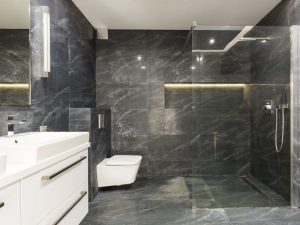
Although it’s by no means the most glamorous item in your bathroom, the position of your toilet should be the first item you finalise in your bathroom layout and design. This position will most likely be dictated by the entry point of the soil pipe, so once you have this noted you can the build your layout and design around it.
On a piece of paper (of course, we love graph paper), start to draw different bathroom layouts around the position of your toilet, making sure you include any showers, baths, basins, windows, doors, alcoves, sloping ceilings, bulkheads etc. that you may like to include.
Drawing different designs out will assist you in better understanding your space and the layout and design options you do and don’t like. From here, you can then move onto colour.
When it comes to colour, whites and neutral tones provide a sense of space and are ideal for small or odd-shaped bathrooms, in addition to those that require a timeless canvas so any feature items, such as stone or timber textures, lighting, and plants, can shine. Whereas dark tones tend to close in a space and as such, are best kept for large bathrooms or feature items.
At MW Homes, our team will discuss your bathroom layout, design and colour preferences with you, in addition to providing some new ideas based on our extensive experience. We’ll then work together to finalise the perfect bathroom layout, design and colour palette for your lifestyle.
Trends
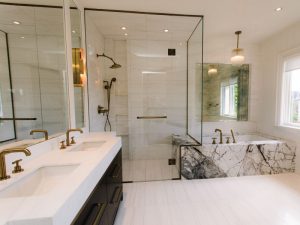
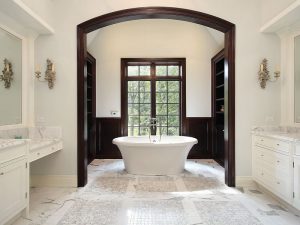 When it comes to bathroom layouts, open plan designs inspired by calming spa-like styling and statement pieces continue to trend. The best part about this trend, is that it is easily adaptable to any decorating style.
When it comes to bathroom layouts, open plan designs inspired by calming spa-like styling and statement pieces continue to trend. The best part about this trend, is that it is easily adaptable to any decorating style. 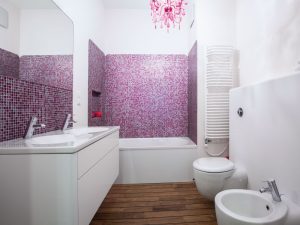
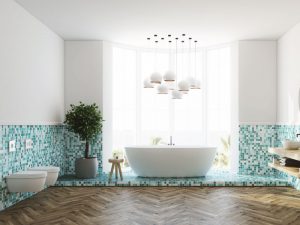 As for colour, given bathroom renovations are generally expected to last for at least 10 years, we don’t expect whites or neutrals to ever date. However, we are seeing more colour being incorporated into bathroom designs, through tiles, grout, stone and high-gloss vanity joinery. Blush pink, blues and metallics are trending, in addition to a mix of finishes rather than the same finish throughout.
As for colour, given bathroom renovations are generally expected to last for at least 10 years, we don’t expect whites or neutrals to ever date. However, we are seeing more colour being incorporated into bathroom designs, through tiles, grout, stone and high-gloss vanity joinery. Blush pink, blues and metallics are trending, in addition to a mix of finishes rather than the same finish throughout.Decision-making time
- What decorating style/s are you drawn to? What look and feel do you want to create?
- Who will be using your bathroom the most?
- How often will your bathroom be used?
- What practical requirements do you require your new bathroom to fulfil?
- Are there any key features you’d like to include in your new bathroom?
FAQs
Bathroom Renovating – Baths, showers and vanities:
You may have a certain look in mind for your bathroom’s bath, shower and vanities, but with so many different designs available it’s hard to know where to start.
To make it easy, we’ll take you through the following areas, to assist you in selecting the perfect bath, shower and vanities for your lifestyle:
- First step
- Trends
- Decision-making time
- FAQs
First Step
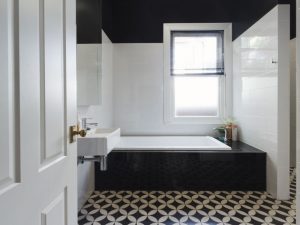
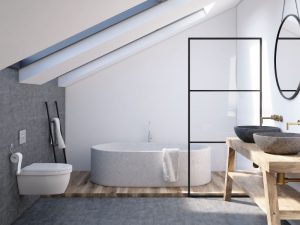 There has never been a more exciting time to select a bath than now, however with so many designs available we know how easy it can be to get carried away with the look as opposed to first thinking about the practicality of incorporating one into your space. As a general rule, a standard bath size is 1,700mm (long) x 700mm (wide), however there are also smaller and larger sizes available, depending on what best suits your room. It’s also important to keep in mind that due to weight restrictions your bath options may be limited if your room is on an upper floor. Once you have determined the space you have to play with, you can then move onto the design. Freestanding bathtubs continue to grow in popularity and can also act as a statement piece within your bathroom design. A recessed bath is still a popular option, especially for small spaces, as is a showerbath. However, if you are decorating your ensuite or have the luxury of space, then you may even want to consider a jacuzzi over a freestanding bath. Showers
There has never been a more exciting time to select a bath than now, however with so many designs available we know how easy it can be to get carried away with the look as opposed to first thinking about the practicality of incorporating one into your space. As a general rule, a standard bath size is 1,700mm (long) x 700mm (wide), however there are also smaller and larger sizes available, depending on what best suits your room. It’s also important to keep in mind that due to weight restrictions your bath options may be limited if your room is on an upper floor. Once you have determined the space you have to play with, you can then move onto the design. Freestanding bathtubs continue to grow in popularity and can also act as a statement piece within your bathroom design. A recessed bath is still a popular option, especially for small spaces, as is a showerbath. However, if you are decorating your ensuite or have the luxury of space, then you may even want to consider a jacuzzi over a freestanding bath. Showers 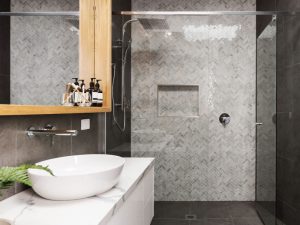
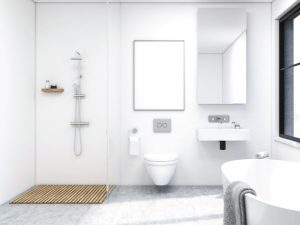 As one of the most used items in your bathroom, getting the most of your shower tends to come down to good planning. Enclosures with fixed glazed panels and sliding shower doors work well in small spaces, whereas enclosures with doors that swing open are an attraction option for larger rooms. In addition to functionality, you also need to consider the style of shower you prefer, which generally comes down to three frame options: framed, frameless or semi-frameless. Once you’ve selected your enclosure, you then need to consider the type of shower head you would like. The most common styles are fixed, hand-held, massage, waterfall, high- and low-pressure jets. Vanities
As one of the most used items in your bathroom, getting the most of your shower tends to come down to good planning. Enclosures with fixed glazed panels and sliding shower doors work well in small spaces, whereas enclosures with doors that swing open are an attraction option for larger rooms. In addition to functionality, you also need to consider the style of shower you prefer, which generally comes down to three frame options: framed, frameless or semi-frameless. Once you’ve selected your enclosure, you then need to consider the type of shower head you would like. The most common styles are fixed, hand-held, massage, waterfall, high- and low-pressure jets. Vanities 
 If there’s one item every bathroom requires, it’s a vanity. Combining storage, design and bench space, your vanity is the one item you don’t want to compromise. It’s important to be clear on all the practical requirements your vanity needs to juggle before moving onto the design. Wall-mounted or semi-pedestal designs complemented with minimalistic shelving are ideal for small spaces or dark coloured bathrooms, as they provide a sense of space in addition to providing the flexibility of setting the height at one that best suits your lifestyle. Whereas, full pedestal basins are more suited to traditional decorating styles. Double sinks are also a popular choice for shared bathrooms, especially ensuites. At MW Homes, our team will discuss your bath, shower and vanity preferences with you, in addition to providing some new ideas based on our extensive experience. We’ll then work together to finalise the perfect bath, shower and vanity for your lifestyle.
If there’s one item every bathroom requires, it’s a vanity. Combining storage, design and bench space, your vanity is the one item you don’t want to compromise. It’s important to be clear on all the practical requirements your vanity needs to juggle before moving onto the design. Wall-mounted or semi-pedestal designs complemented with minimalistic shelving are ideal for small spaces or dark coloured bathrooms, as they provide a sense of space in addition to providing the flexibility of setting the height at one that best suits your lifestyle. Whereas, full pedestal basins are more suited to traditional decorating styles. Double sinks are also a popular choice for shared bathrooms, especially ensuites. At MW Homes, our team will discuss your bath, shower and vanity preferences with you, in addition to providing some new ideas based on our extensive experience. We’ll then work together to finalise the perfect bath, shower and vanity for your lifestyle.Trends
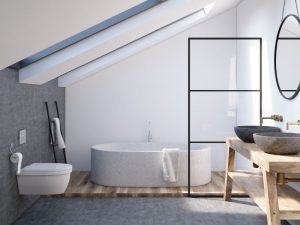 Basins are starting to take centre stage, as vessel liked shapes are mounted on vanity benchtops. From metallics and floral-printed ceramic to rustic natural stone bowls, there’s an array of colours, textures, patterns and shapes to suit any decorating style. To amp up the design factor, we’re also seeing an increasing trend towards statement taps.
Basins are starting to take centre stage, as vessel liked shapes are mounted on vanity benchtops. From metallics and floral-printed ceramic to rustic natural stone bowls, there’s an array of colours, textures, patterns and shapes to suit any decorating style. To amp up the design factor, we’re also seeing an increasing trend towards statement taps. 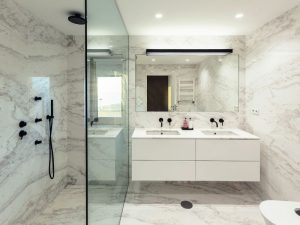 Display shelving alongside the mirror, wall-mounted or floating vanities is also growing in popularity. Together this combination provides a sense of space, while also allowing your personality to shine.
Display shelving alongside the mirror, wall-mounted or floating vanities is also growing in popularity. Together this combination provides a sense of space, while also allowing your personality to shine. 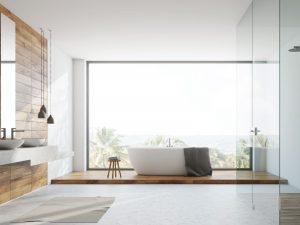 As a minimalistic open plan design continues to dominate, materials and finishes do all the talking to create a seamless transition from one area to the next.
As a minimalistic open plan design continues to dominate, materials and finishes do all the talking to create a seamless transition from one area to the next.Decision-making time
- What is your decorating style? / What look and feel do you want to create?
- Who will use your bathroom?
- How often will you use your bathroom?
- Do you have children or pets?
- How big is your space?
- What items are mandatory?
- Where would you like each item placed?
- What is your overall renovation budget and how much of this do you want to dedicate to these items?
FAQs
Bathroom Renovating – Tiles and flooring solutions:
You may have a certain look in mind for your bathroom, but with so many different tile and flooring designs available it’s hard to know where to start.
To make it easy, we’ll take you through the following areas, to assist you in selecting the perfect tiles and flooring solution for your lifestyle:
- First step
- Trends
- Decision-making time
- FAQs
First Step
From making a statement to creating a timeless foundation for the rest of your décor, selecting tiles and flooring for your bathroom all comes down to the look and feel you want to create, in addition to also meeting the practical requirements of your lifestyle.
So as a first step, let’s look at the different types of tile and flooring solutions:
Ceramic tiles
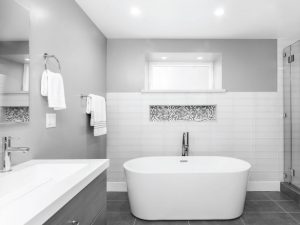
Made from clay and permanently hardened by heat, the wide range of colours, sizes and designs now available in ceramic tiles make them a popular choice, especially for bathroom walls.
Key features:
- Cost effective
- Easy to maintain
- Available in a wide range of colours, sizes and designs
Key considerations:
- Due to the construction, ceramic tiles aren’t as durable as porcelain tiles
- Available in glazed or unglazed – this finish sits on top of the base (often referred to as a ‘biscuit’). Unglazed ceramic tiles are porous, whereas glazed ceramic tiles are water resistant and better suited to the bathroom.
- If you are considering glazed ceramic tiles for your bathroom floor, ensure it has a suitable anti-slip rating
Porcelain tiles
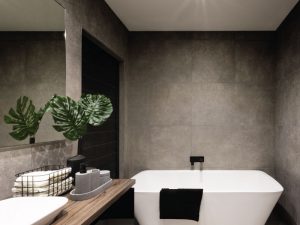
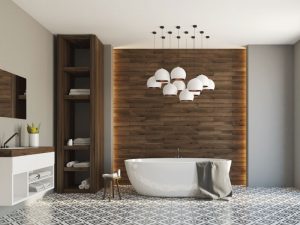
Constructed from clay and permanently hardened by heat, the pressing and firing process makes porcelain tiles a stronger and less porous material when compared to ceramic. Available in an array of colours, textures, sizes and designs to suit any decorating style, porcelain tiles are a popular bathroom floor and wall solution for those with busy lifestyles.
Key features:
- Durable
- Water and stain resistant
- Easy to maintain
- Due to the construction, the colour, pattern and finish goes the whole way through the tile, as opposed to ceramic tiles where these elements just sit on top of the base
Key considerations:
- Not all porcelain tiles are the same – if you are considering these for your bathroom floor, ensure it has a suitable anti-slip rating
- Porcelain tiles are generally priced higher than ceramic tiles
Composite stone tiles – terrazzo and reconstituted
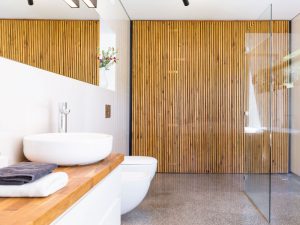
A fashionable choice for your bathroom walls or floors, terrazzo and reconstituted stone tiles are made from a blend of natural stone chips and cement.
Key features:
- Consistent pattern
- Durable
- Stain and scratch resistant
- Reconstituted stone tiles have a wide range to select from, with many replicating the beauty of natural stone
Key considerations:
- Terrazzo tiles need to be sealed and regularly maintained, to ensure they keep their stunning looks for many years to come
- During the construction process, reconstituted stone tiles have a resin or polymer that is added to the mix, so unlike terrazzo tiles they don’t require sealing
- If you are considering composite stone tiles for your bathroom floor, ensure they have a suitable anti-slip rating
Natural Stone tiles – granite, limestone, marble, sandstone, slate and travertine
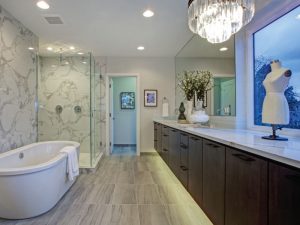
Adding instant style to any space, the beauty and unique designs of natural stone tiles make them a highly sought-after feature in bathrooms.
Key features:
- Available in a wide range of sizes and finishes
- Durable
- Unique design – no one tile is the same
Key considerations:
- As a natural material, they tend to be priced at the higher end of the scale
- Requires regular resealing and maintenance, to ensure they maintain their timeless looks
- If you are considering natural stone tiles for your bathroom floor, ensure they have a suitable anti-slip rating
Glass tiles
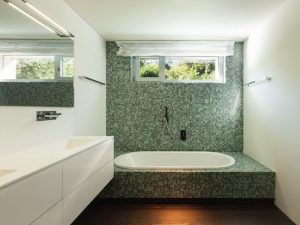
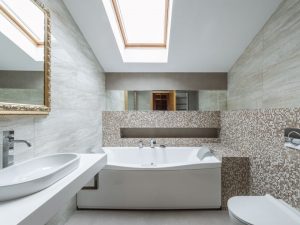
A popular choice for bathroom feature walls, glass tiles are generally created by fusing several thin sheets of glass in a kiln to create one sheet. Others are created by melting glass powders in a kiln, before proceeding through several heating and soaking cycles before they are fused together.
Key features:
- Available in a wide range of shapes, colours, designs and material combinations
- Creates a statement
- Easy to maintain
- Water resistant
Key considerations:
- Delicate material
- Longer installation period compared to other tiles
Luxury vinyl flooring
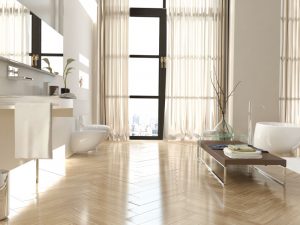
A synthetic flooring solution which mimics the look and feel of engineered timber flooring, luxury vinyl is a popular choice for those with busy lifestyles.
Key features:
- Available in a wide range of designs, widths and lengths
- Cost efficient
- Easy to maintain
- Hard wearing
- Soft and warm underfoot
Key considerations:
- Does not provide the sound of engineered or hardwood timber flooring
- Not suitable for humid climates
Rigid flooring
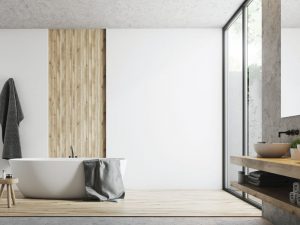
The latest innovation in synthetic flooring is rigid (or hybrid) flooring. Rigid combines the structural stability of engineered flooring with the practicality of a laminate or luxury vinyl.
Key features:
- Available in a wide range of timber designs, widths and lengths
- Durable
- Solid core construction – this allows it to be installed over virtually any surface (with little or no preparation work) and ensures it isn’t affected by extreme temperature changes
- Sounds like engineered timber flooring (unlike luxury vinyl)
Concrete flooring
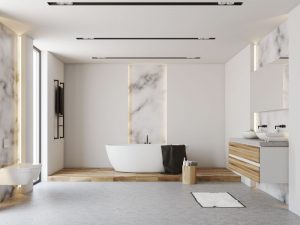
An increasingly popular choice for bathroom floors, concrete floors create a timeless foundation that is ideal for both industrial or modern decorating styles.
Key features:
- Easy to clean
- Durable
- Water resistant
Key considerations:
- Requires an anti-slip finish, as polished concrete can be very slippery when wet
- As a porous material, it requires a seal to ensure it is stain resistant
- It can be quite cold underfoot, which is why underfoot heating is a popular solution for those with concrete bathroom floors
Trends
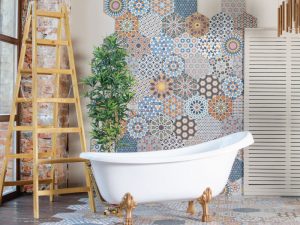
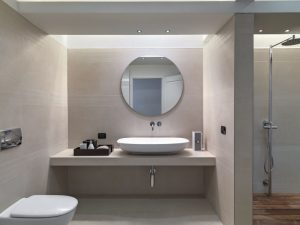
When it comes to tiles, there’s no doubt large format tiles for both wall and floors are continuing to grow in popularity. However, for those looking a different wall and floor solution, tile patterns such as herringbone, scallop and pennyround are at the forefront of interior bathroom design, in addition to the re-emergence of patchwork tiles.
Although large format tiles minimise the amount of grout showing, we’re now seeing patterned tiles on walls teamed with coloured grout in contrasting, bright or metallic tones, further enhancing these items as key design statements within the room.
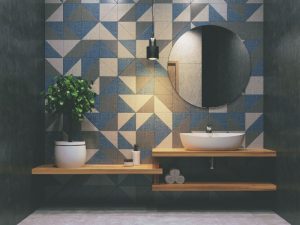
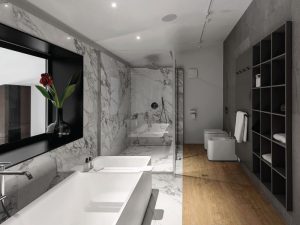
The timeless beauty of natural stone and timber designs on bathroom walls and floors continue to dominate. However, when it comes to colour, muted tones and blues (from blackened blues to those with hints of green and metallic) have taken centre stage.
Decision-making time
Like all renovating decisions, selecting the right tiles and flooring for your bathroom comes back to what best suits your lifestyle. To assist you with this, ask yourself the following questions:
- What is your decorating style? / What look and feel do you want to create?
- Where would you like tiles placed?
- Would you like your tiles and/or flooring to create a statement in your bathroom, or provide a timeless foundation for the other items in your room?
- Do you have children or pets?
- How often will your bathroom be used?
FAQs
How easy is it to replace flooring?
The new flooring you select for your bathroom, in addition to whether you have chosen to have underfloor heating or not, will impact the amount of work required. However, as a general rule once your existing floor is removed some preparation work on your sub-floor will be required to ensure its level and capable of supporting everything that will sit on-top of it (e.g. bath, shower, toilet, vanity etc), before your new flooring is installed.
Can I use natural timber flooring in my bathroom?
Due to its natural properties, timber flooring has generally been avoided in bathrooms, however it’s not completely out of the question. The construction process of most engineered timber flooring options makes them unsuitable for wet areas, whereas most solid timber flooring can be used providing it has the relevant treatments to make it suitable for wet areas.
Do large format tiles work in small spaces?
With fewer grout lines to break up the view, large format tiles in light or neutral colours and patterns provide a sense of space – as they help make the room feel wider and the ceiling higher.
Bathroom Renovating – Lighting and heating:
You may have certain lighting and heating requirements in mind for your bathroom, but with so many different options available it’s hard to know where to start.
To make it easy, we’ll take you through the following areas, to assist you in selecting the perfect lighting and heating solutions for your lifestyle:
- First step
- Trends
- Decision-making time
- FAQs
First Step
From making a statement to seamlessly tying into the rest of your décor, selecting lighting for your bathroom all comes down to the look and feel you want to create, in addition to also meeting the practical requirements of your lifestyle.
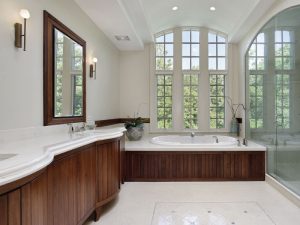
As you start to think about the lighting for your bathroom, first consider whether there are any areas you’d like to highlight, in addition to the amount of natural light that enters during the day. As bathrooms are split into different zones to comply with building regulations, it’s also important to ensure the lighting you select reflects the zone it will be used in. For example, Zone A may be within a shower enclosure, whereas Zone C may be above your vanity.
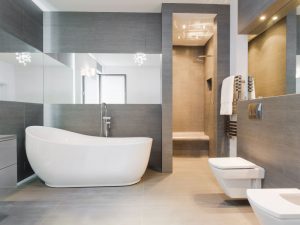
A popular lighting combination for bathrooms includes downlights (for background lighting), task lighting (above mirrors) and accent lighting (to highlight any feature areas within your space). If you have a statement bath and contemporary decorating style, you can make a further design statement by placing feature floor lights in this area.
When considering the style and combination of lights for your space it’s also important to ensure they are all durable, moisture-proof and as energy efficient as possible.
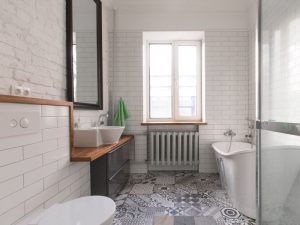
As part of your lighting selections, you may also be considering one that incorporates a heat lamp, especially in cool areas. To ensure your bathroom maintains a comfortable atmosphere, ensure you also consider other heating options, such as radiators, heated towel rails and underfloor heating.
Trends
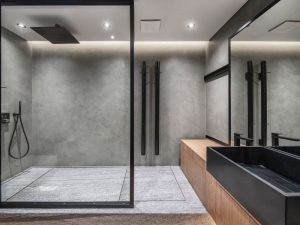
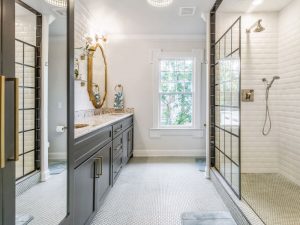
Thanks to LED technology, a layered lighting approach to create ambiance, differentiate areas and highlight statement pieces is continuing to trend. From motion sensor floor lights to glowing LED strips hidden within decorative wall niches or joinery.
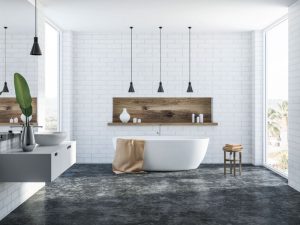
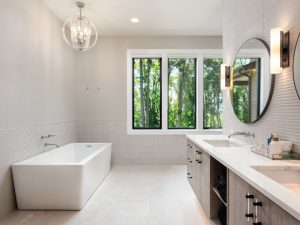
Pendant lights around the vanity are also a perfect lighting solution for any decorating style, as they create a statement while also providing soft flattering light when hung at eye level. For a luxurious feel, oversized lampshades and chandeliers are also continuing to be incorporated in large spaces.
When it comes to bathroom heating solutions, underfloor heating and heated towel rails continue to dominate.
Decision-making time
Like all renovating decisions, selecting the right lighting and heating solutions for your bathroom come back to what best suits your lifestyle. To assist you with this, ask yourself the following questions:
- What is your decorating style? / What look and feel do you want to create?
- Where will your lights be placed?
- Would you like any lights to create a statement in your bathroom, or would you prefer that they all complement the rest of your design?
- How much natural light will be utilised in your space?
- What are your heating requirements?
- Do you have children or pets?
- How often will your bathroom be used?
FAQs
I have a small bathroom, what are my best lighting and heating options?
If your bathroom is in a position that benefits from an abundance of natural light, then windows are a fantastic lighting solution to help open up a space, while also being cost efficient. Other great lighting solutions for small spaces include flush mounted ceiling lights, vanity lighting and a lighted mirror. When it comes to heating, consider a radiator that doubles up as a heated towel rail, or ceiling lighting that incorporates a heat lamp.
Do I need a heated towel rail and underfoor heating?
It all comes down to your requirements, in addition to the size and layout of your bathroom. If you want warm, dry towels then an electric or dual fuel heated towel rail is essential, as it can be turned on when your other heating is off. If you have hard floors, such as concrete or tiles and a medium to large space, a wet room or walk-in shower, then underfloor heating is ideal.

Bathroom Renovating – Fixtures and Fittings:
With an abundance of materials, colours, textures and designs to select from, when it comes to the fixtures and fittings for your bathroom it all comes back to what best suits your lifestyle. To assist you with this, ask yourself the following questions:
+ What is your decorating style? / What look and feel do you want to create?
+ Where will your fixtures and fittings be placed?
+ Do you have children or pets?
+ What type of fixtures and fittings feature in other areas of your home?
+ What role does each fixture and fitting play?
Don’t overthink your answers. At MW Homes, our team make it easy and will be with you every step of the way, to ensure you select the perfect fixtures and fittings for your new bathroom.
CONTACT
Email: office@mwhomes.com.au
Office : Suite 510, 737 Burwood Road
Hawthorn East 3123
(By Appointment)
Mail: PO BOX 449, Canterbury, VIC 3126
FOLLOW US
AWARD WINNING RENOVATIONS





